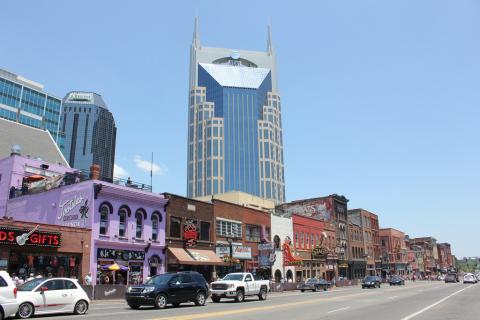Founded in 1779 and named after Francis Nash, a Revolutionary War hero, Nashville quickly became a prosperous city thanks to being a port on the Cumberland River and its designation as the state capital in 1843. Throughout the 19th and 20th centuries, its manufacturing base developed and thrived, fueling the city’s robust growth.
Nashville’s largest expansion occurred between 1960 and 1970 when it annexed 42 square miles of suburbs and more than doubled in size—growing from roughly 171,000 to 448,000 residents. The city’s growth has continued over the past several decades—since 1970, the number of Nashville residents has increased by 40 percent. Helping to foster this growth has been its relatively low cost of living and strong economy, factors that have also made the city a destination for immigrant populations. In fact, between 1990 and 2000, the number of foreign-born Nashville residents increased from about 12,660 to 39,600—a growth rate well over 300 percent.
Today, with nearly 655,000 residents, Nashville is the largest city in Tennessee. According to the U.S. Census Bureau, Nashville is 61 percent white, 10 percent Hispanic, 28 percent black, and 3 percent Asian.
Despite the city’s robust growth, nearly one out of every five Nashville residents lives in poverty, a rate well above that of the state as a whole (19 vs. 13 percent). Poverty is especially high among the city’s minority populations. The Metropolitan Government of Nashville & Davidson County’s Community Needs Evaluation highlights that nearly a third (31 percent) of black residents and over a fifth of Latino/Hispanic residents (21 percent) had incomes below $25,000 in 2015, compared to just 14 percent of the city’s white population. Data from Policy Link’s National Equity Atlas reveal that homeownership rates also vary significantly by race: while 63 percent of Nashville’s white households owned homes in 2014, homeownership rates among Latino and black households were just 29 and 38 percent respectively.
Working to address these disparities are a range of community wealth building organizations such as Urban Housing Solutions, a CDC that owns and operates over 900 affordable apartments and 17,000 square feet of commercial space. Similarly, New Level Community Development Corporation develops affordable housing, provides a range of financial education and homeownership programs, and has a matched savings account program to help families build assets.
The city is also home to several nonprofits operating social enterprises that provide valuable community services while creating jobs and training opportunities for area residents. One such organization is Crossroads Community, which aims to help youth facing adversity and neglected animals by bringing them together to heal. Its social enterprise, Crossroads Pets- Shop & Adopt Store, provides youth paid training opportunities and community members pet products and grooming services, while functioning as a pet adoption center for rescued animals.
City government and other anchors are also playing an important role in strengthening the local economy. For example, to ensure Nashville residents can access jobs in the region’s growing construction industry, Mayor Megan Barry catalyzed the Nashville Construction Readiness Partnership (NCRP), which focuses on developing and implementing strategies that connect area employers to workers, and providing training for residents with no prior construction experience.
An overview of these and other exemplary community wealth building efforts follows:

